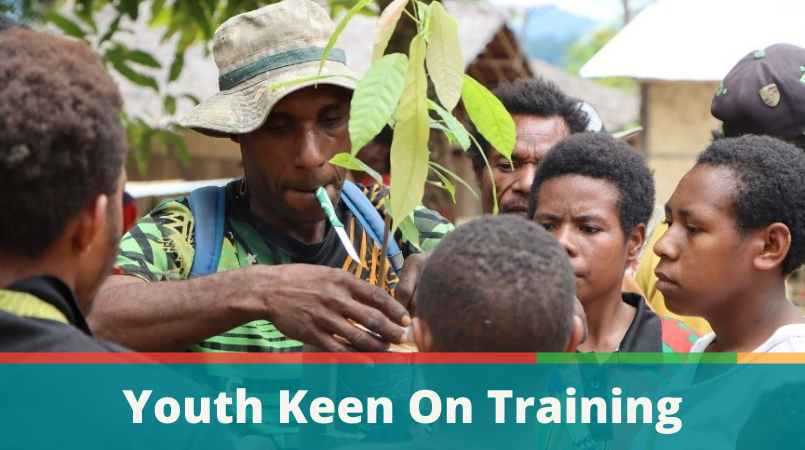
EU-STREIT Programme in PNG, further to its mission to encourage more youth to participate in agriculture as a profession, pulled together 626 lead farmers, 335 youth from the Greater Sepik Region.
The Food and Agriculture Organization of the United Nations (FAO) under the EU Funded UN Joint STREIT Programme in PNG recently conducted six capacity building trainings for cocoa and vanilla farmers in different remote parts of the Greater Sepik Region.
The interests shown by the youths were the highlights in all training venues who made up 54 percent of total 626 trainees.
Conducted in collaboration with Cocoa Board and Provincial Division of Agriculture and Livestock, four out of six trainings were focused on imparting knowledge, techniques and skills on cocoa bud grafting (propagation) that were held in Fatima, Lumi District Sandaun Province and Passam village in East Sepik Province.
The two other trainings were organized in collaboration with the DAL/Spice Board to build the capacity of rural farmers in Mioseng Village, Drekikier and Aupik village, Maprik District, East Sepik Province on vanilla, husbandry and processing.
It was the first for many enthusiastic girls and boys to attend a formal, tailored training on advanced, efficient agricultural practices. The participants are expected to pass on the new skills to at least 10 other people in their clusters.
“I know how to look after my plants, but I now know my mistakes to improve,” said Wilson Kuma, 23, a farmer from Mioseng village.
Many rural farmers live on cocoa gardens and cocoa cultivation that have been affected by cocoa pod borer (CPB) pests’ infestation, which destroyed the lifeline of almost the entire cocoa-dependent rural population in the Greater Sepik Region.
Hence, the desire for new knowledge and support to revive these CPB infested trees resulted in an additional 75 participants who attended as observers in the 3 cocoa block management trainings in Sandaun Province.
“EU-STREIT PNG Programme encourage the equal participation of women and youth as they play important role on the development of cocoa value chain. The technical skill gained from the budding training enables participants to replace old cocoa trees with new clone seedlings to increase production and improve livelihood,” explained Dr Rabi Rasaily, the Programme’s Senior Agricultural Officer who led the mission to Sandaun Province.
The trainings, which include practical sessions, also covered Integrated Pest and Disease Management (IPDM) that will enable farmers to apply appropriate pruning and shade control practices on their blocks as per eco-friendly methods and practices with zero tolerance on use of pesticides.
The cocoa farmers were also presented with shade clothes and 15,000 poly bags to raise their CPB tolerant seedlings in new nursery set-ups supported by EU-STREIT PNG Programme.
Meanwhile, those who attended the vanilla sessions were trained on how to pollinate the vanilla flowers efficiently by using a simple but viable technique to lift the rostellum, which acts as a shield between the stamen and stigma, and press the stamen with the thumb gently down to the stigma for a successful pollination.
“The advantage of this method is the speed and accuracy to pollinate flowers in the morning between 6.30 am and 10.30 am,” explained Nanda Siri, the Programme’s National Vanilla Production Officer to farmers in Moiseng.
